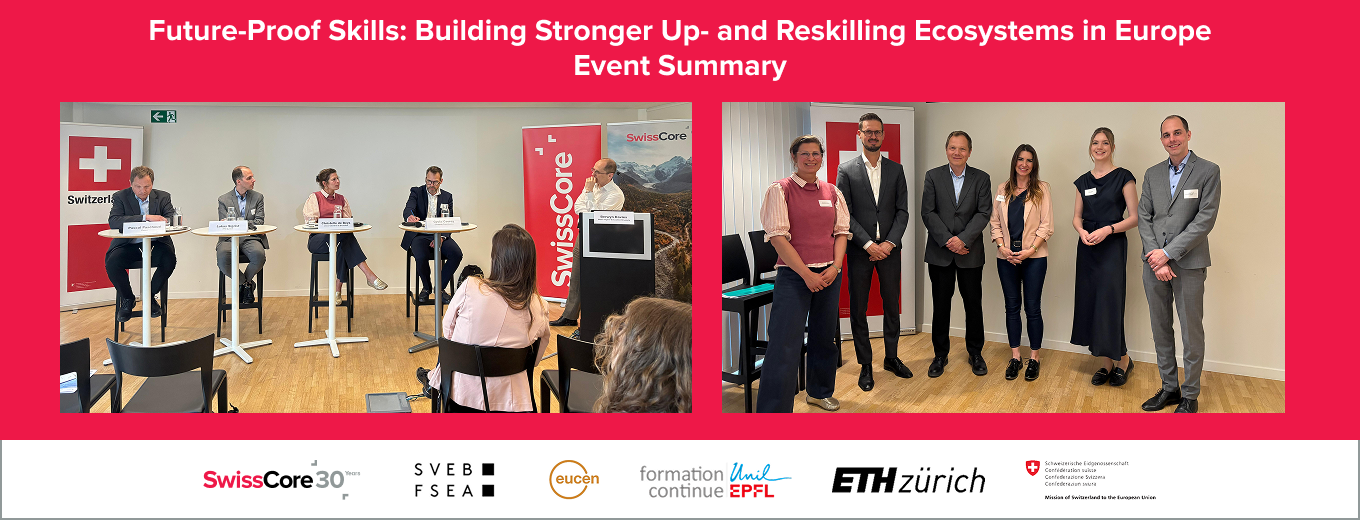SwissCore organised its annual Education Briefing on adult up- and reskilling, highlighting the Swiss approach alongside European insights.
SwissCore organised an insightful event focused on the evolving landscape of adult learning, up- and reskilling and higher education institutions’ role in supporting lifelong learning. The programme featured two presentations, on the adult education system in Switzerland and on the Union of Skills framework, as well as two engaging panel discussions addressing challenges and solutions for more effective and inclusive adult education systems.
The event opened with remarks from Alexander Renggli, Deputy Head of the Mission of Switzerland to the EU, and Tatjana Babrauskiené, Member of the European Economic and Social Committee (EESC), who highlighted the pressing challenge, noting the very low share of adults currently receiving training, far below the EU’s target. A video message from Sabine Scheiben, Head of Unit Continuing Education at the Swiss State Secretariat for Education, Research and Innovation (SERI), was shared with the audience, providing an overview of the Swiss adult education system. She highlighted the variety of learning pathways, including non-formal continuing education and in-house company training. The Swiss free-market framework enables flexibility and responsiveness to demand, while also allowing state intervention when necessary, particularly in areas such as adult basic skills.
The first panel brought together experts from Denmark, Switzerland and the EU to discuss the ecosystem needed and the actors involved to strengthen lifelong learning. After presenting the Swiss adult education system characterised by a dynamic market of primarily private providers, Bernhard Grämiger, Director of the Swiss Federation for Adult Learning (SVEB), stressed that while Swiss adult education providers prioritise quality assurance, they also face intense competition. Grämiger also highlighted disparities in training participation between highly qualified and less qualified adults, emphasising the need for investments in upskilling initiatives for the low qualified workforce. The role of small and medium-sized enterprises (SMEs), crucial in the Swiss system, and the need for incentives for their participation in the adult training ecosystem was also noted. From the Danish perspective, Emilia Chantell Lind, Consultant at the Education and Guidance Center Department of the Hillerød Municipality, shared insights on the model that aligns regional programmes closely with local industry needs. She presented the success of early job experience programmes and regional skilling systems that integrate public training services.
The second panel examined the critical role of higher education institutions in advancing lifelong learning through tools such as micro-credentials and individual learning accounts. Gyula Cserey, Head of Unit for Strategy and Investments at the Directorate-General for Education, Youth, Sport and Culture of the European Commission, emphasised the importance of clear communication and co-creation in developing micro-credentials, underlining the EU’s added value in funding and supporting structural reforms. Pascal Paschoud, Director of Continuing Education at the University of Lausanne and EPFL), discussed the concept of universities as lifelong learning partners and Lukas Sigrist, Director of the ETH Zurich School for Continuing Education, highlighted how collaboration between universities and businesses can better align continuing education offers, illustrating Switzerland’s growing micro-credential system. Christelle de Beys, Head of the Continuing Education Office at the Université Libre de Bruxelles (ULB) shared ULB’s decentralised continuing education approach, targeting key sectors via multiple training centres.
SwissCore extends its gratitude to all speakers and panellists for their expert insights and to the participants for their engagement. Special thanks also go to the Swiss Mission to the EU and the Welsh Higher Education Office in Brussels for their support in organising and moderating the event. We look forward to continuing the discussion on how to build effective lifelong learning ecosystems.

